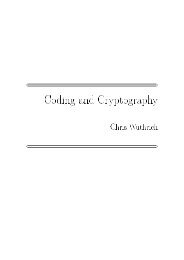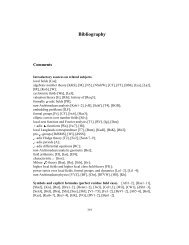ENTANGLEMENT OF GAUSSIAN STATES Gerardo Adesso
ENTANGLEMENT OF GAUSSIAN STATES Gerardo Adesso
ENTANGLEMENT OF GAUSSIAN STATES Gerardo Adesso
Create successful ePaper yourself
Turn your PDF publications into a flip-book with our unique Google optimized e-Paper software.
140 7. Tripartite entanglement in three-mode Gaussian states<br />
here is that Eq. (7.49) preserves the Gaussian character of the initial state, as<br />
can be straightforwardly checked for any initial CM σ0 by inserting the Gaussian<br />
characteristic function χ(ξ, t),<br />
1 −<br />
χ(ξ, t) = e 2 ξTΩ T σ(t)Ωξ+iX T ΓtΩξ<br />
, (7.50)<br />
where X are generic initial first moments, σ(t) ≡ Γ 2 t σ0 + ( − Γ 2 t )σ∞, and Γt ≡<br />
⊕ie −γit/2 2, into the equation and verifying that it is indeed a solution. Notice<br />
that, for a homogeneous bath, the diagonal matrices Γt and σ∞ (providing a full<br />
characterization of the bath) are both proportional to the identity. In order to<br />
keep track of the decay of correlations of Gaussian states, we are interested in the<br />
evolution of the initial CM σ0 under the action of the bath which, recalling our<br />
previous Gaussian solution, is just described by<br />
σ(t) = Γ 2 t σ0 + ( − Γ 2 t )σ∞ . (7.51)<br />
This simple equation describes the dissipative evolution of the CM of any initial<br />
state under the action of a thermal environment and, at zero temperature, under the<br />
action of “pure losses” (recovered in the instance ni = 0 for i = 1, . . . , N). It yields<br />
a basic, significant example of ‘Gaussian channel’, i.e. of a map mapping Gaussian<br />
states into Gaussian states under generally nonunitary evolutions. Exploiting<br />
Eq. (7.51) and our previous findings, we can now study the exact evolution of the<br />
tripartite entanglement of Gaussian states under the decoherent action of losses<br />
and thermal noise. For simplicity, we will mainly consider homogeneous baths.<br />
7.4.1.2. Robustness of tripartite entangled states. As a first general remark let us<br />
notice that, in the case of a zero-temperature bath (n = 0), in which decoherence<br />
is entirely due to losses, the bipartite entanglement between any different partition<br />
decays in time but persists for an infinite time. This is a general property of Gaussian<br />
entanglement [212] under any multimode bipartition. The same fact is also<br />
true for the genuine tripartite entanglement, quantified by the residual Gaussian<br />
contangle. If n = 0, a finite time does exist for which tripartite quantum correlations<br />
disappear. In general, the two-mode entanglement between any given mode<br />
and any other of the remaining two modes vanishes before than the three-mode<br />
bipartite entanglement between such a mode and the other two — not surprisingly,<br />
as the former quantity is, at the beginning, bounded by the latter because of the<br />
CKW monogamy inequality (6.2).<br />
The main issue addressed in this analysis consists in inspecting the robustness<br />
of different forms of genuine tripartite entanglement, previously introduced<br />
in Sec. 7.3. Notice that an analogous question has been addressed in the qubit<br />
scenario, by comparing the action of decoherence on the residual tangle of the inequivalent<br />
sets of GHZ and W states: W states, which are by definition more robust<br />
under subsystem erasure, proved more robust under decoherence as well [48]. In<br />
our instance, the symmetric GHZ/W states constitute a promising candidate for<br />
the role of most robust Gaussian tripartite entangled states, as somehow expected.<br />
Evidence supporting this conjecture is shown in Fig. 7.5, where the evolution in<br />
different baths of the tripartite entanglement of GHZ/W states, Eq. (7.40), is compared<br />
to that of symmetric T states, Eq. (7.44) (at the same initial entanglement).<br />
No fully symmetric states with tripartite entanglement more robust than GHZ/W







